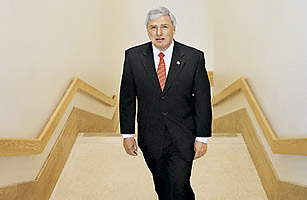
The FDA wields enormous influence on American lives. It regulates roughly a quarter of the U.S. economy, including food, drugs, medical devices and cosmetics. But despite a long-standing reputation for operating above politics, the agency for the past several years has been roiled with problems of a political nature: advisory committees accused of conflicts of interest; a partisan approach to the Plan B contraceptive drug; the recent finding that marijuana has no medical benefit, despite evidence that it does; and the sudden and mysterious resignation of Lester Crawford, who served as commissioner for only two months. Stepping into that battleground is Dr. Andrew C. von Eschenbach, 64, a longtime Bush family friend and urological surgeon who left the M.D. Anderson Cancer Center in 2002 to head the National Cancer Institute. Given the political minefield surrounding Plan B—some powerful Senators haven't forgotten that the Bush Administration broke its promise to decide whether Plan B should be sold over the counter — von Eschenbach may never be confirmed as commissioner. If the Senate does hold confirmation hearings, the doctor will have to overcome suspicions that he is more concerned with drug approvals than with drug safety.
Although his career has been focused on curing disease, von Eschenbach has a unique opportunity to prevent disease by bolstering the long-neglected food side of the agency. Americans spend $30 billion a year for drugs to treat hypertension and heart disease, and obesity costs the nation $100 billion more. Yet apart from occasionally updating food labels, the FDA does almost nothing to improve our diet. (Just helping Americans halve their salt consumption and banning partially hydrogenated vegetable oil could save 100,000 lives a year.) If von Eschenbach spends as much energy on foods as he is expected to spend on drugs, he could make a signal contribution to the public's health.
Jacobson is executive director of the Center for Science in the Public Interest